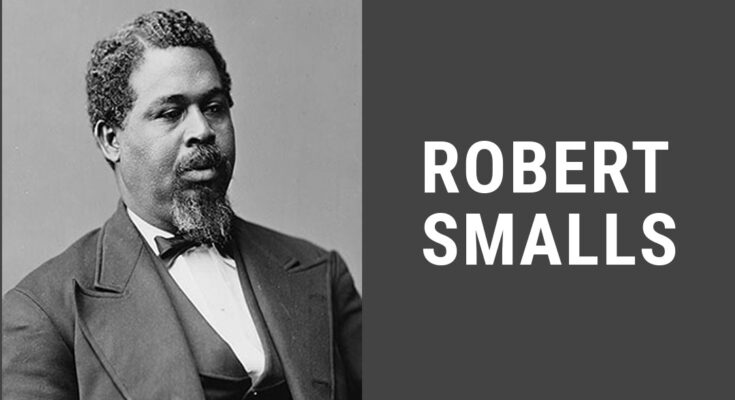Civil War Hero, Political Leader During Reconstruction
Robert Smalls was a Civil War hero and prominent black political leader during the Reconstruction Era. He was born in 1839 in Beaufort, South Carolina, where he was enslaved by a local planter. At 23, Smalls won freedom for himself and his family and became a famous war hero. During the Reconstruction era, he served in both the state and national legislature and was a respected leader in his community.
Smalls grew up in the Lowcountry of South Carolina, where his mother Lydia Polite was also enslaved by Henry McKee at 511 Prince Street in Beaufort. Smalls was sent to Charleston at age 12 to work as a waiter in a hotel and eventually hired out at the city’s docks. There, he met Hannah Jones, an enslaved woman, and they were married around 1856.
When the Civil War broke out in 1861, Smalls was a crew member on the Planter, a ship operating in the Charleston Harbor that was contracted out to the Confederate army as a transport vessel. In early 1862, Smalls decided to free himself and his family. On May 12th, he took advantage of the absence of the white crew members and, with the help of other enslaved crew members, sailed the Planter past the Confederate forces at Fort Sumter and Fort Moultrie to freedom. Smalls turned the ship over to the United States Navy and provided valuable intelligence on Confederate operations in the Charleston Harbor.
Throughout the Civil War, Smalls served as a pilot on several naval vessels, including the Keokuk, which was eventually sunk by enemy fire, injuring Smalls in the process. He was eventually promoted to captain and given command of the Planter, and in 1864 he purchased the mansion of his former enslaver, Henry McKee, using prize money from the capture of the Planter. Smalls became a natural leader in Beaufort and a respected figure in the military and civilian populations.
In 1864, Smalls entered politics, serving as a delegate to the Republican National Convention and organizing a boycott that led to the desegregation of Philadelphia’s transit system in 1867. He also went into business with Richard Gleaves, opening a store for freedmen. Smalls was an advocate for public education and served as a delegate to the South Carolina state convention that wrote a new constitution in 1868.
Robert Smalls is buried at the Tabernacle Baptist Church in Beaufort, South Carolina, where his legacy as a war hero and political leader continues to inspire. There is a statue of Robert Smalls at the Fort Sumter and Fort Moultrie National Historical Park, Reconstruction Era National Historical Park.
Read more about the magnificent Robert Smalls at https://www.pbs.org/wnet/african-americans-many-rivers-to-cross/history/which-slave-sailed-himself-to-freedom/.
Photograph of Smalls – Library of Congress.





